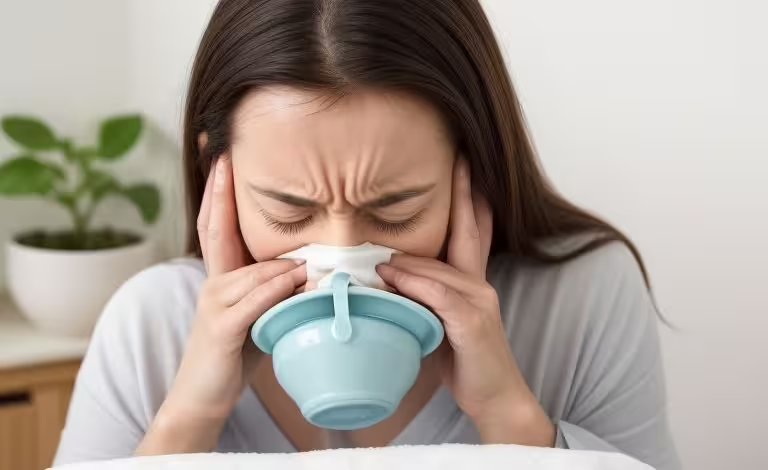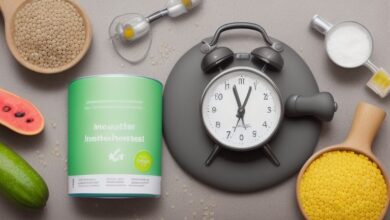How to Get Rid of a Sinus Infection in 24 Hours: Fast and Effective Remedies

How to Get Rid of a Sinus Infection in 24 Hours: Fast and Effective Remedies
A sinus infection can be incredibly uncomfortable, leaving you feeling congested, foggy, and even in pain. While some sinus infections can take several days or weeks to fully clear up, you may wonder if it’s possible to get rid of a sinus infection in just 24 hours. The good news is, with the right approach, you can alleviate most symptoms quickly and give your body the best chance to recover rapidly.
In this article, we'll cover the best ways to combat a sinus infection within a day. This comprehensive guide will include natural remedies, over-the-counter medications, and preventive measures to help you recover fast.

Understanding Sinus Infections
Before diving into how to treat a sinus infection quickly, it’s important to understand what causes it. A sinus infection, also known as sinusitis, occurs when the tissues lining your sinuses become inflamed. This inflammation can be caused by bacteria, viruses, allergens, or even environmental irritants.
Types of Sinusitis
- Acute Sinusitis: Typically lasts for 2-4 weeks and is often caused by viral infections like the common cold.
- Chronic Sinusitis: Lasts longer, generally 12 weeks or more, and can result from repeated infections or nasal issues.
- Subacute Sinusitis: Lasts between 4 and 12 weeks and may need a more focused treatment approach.
Common symptoms include nasal congestion, facial pain, headaches, fever, and a reduced sense of smell or taste.
Can You Get Rid of a Sinus Infection in 24 Hours?
While it's unlikely to completely cure a sinus infection within 24 hours, you can significantly reduce your symptoms and improve your overall comfort. The goal is to alleviate congestion, relieve pain, and support your immune system to fight off the infection quickly. Below are the most effective strategies to help you get rid of a sinus infection fast.
Fast and Effective Remedies for Sinus Infections
1. Use a Saline Nasal Spray
A saline nasal spray is one of the quickest and safest methods to relieve sinus congestion. It works by thinning the mucus in your nasal passages, making it easier to breathe. You can buy a saline spray at any pharmacy, or make your own at home using distilled water, salt, and baking soda.
How to Use a Saline Nasal Spray:
- Tilt your head slightly and spray the solution into one nostril.
- Allow it to drain out by tilting your head forward.
- Repeat on the other nostril.
Use the spray 2-3 times a day for immediate relief from congestion.
2. Try a Neti Pot
A Neti pot is another effective way to flush out mucus and clear your sinuses. It’s particularly helpful if you want quick relief from sinus pressure and congestion.
How to Use a Neti Pot:
- Fill the Neti pot with a saline solution (a mixture of distilled water and salt).
- Tilt your head over a sink and insert the spout into one nostril.
- Allow the solution to flow through your nasal cavity and out the other nostril.
This natural remedy can be done twice daily and is highly effective at loosening thick mucus and reducing inflammation.
3. Inhale Steam
Inhaling steam is an excellent way to moisten your nasal passages and clear blocked sinuses quickly. Steam can help to loosen mucus, making it easier to expel and reducing pressure in your sinuses.
How to Inhale Steam:
- Boil water and pour it into a large bowl.
- Lean over the bowl and cover your head with a towel.
- Breathe deeply through your nose for 5-10 minutes.
For an added benefit, you can add essential oils like eucalyptus or peppermint, which have anti-inflammatory properties that can further ease sinus congestion.
4. Apply Warm Compresses
Applying a warm compress to your face can provide immediate relief from sinus pain and pressure. The warmth helps to increase circulation and reduce inflammation in your sinuses.
How to Use a Warm Compress:
- Soak a clean cloth in warm water.
- Wring out the excess water and fold the cloth.
- Place it on your forehead, cheeks, or over your nose for 10-15 minutes.
Repeat this process several times throughout the day to relieve sinus pain quickly.
5. Stay Hydrated
Drinking plenty of fluids is crucial when trying to get rid of a sinus infection. Staying hydrated helps to thin the mucus in your nasal passages, making it easier for your body to clear it out. Aim for at least 8-10 glasses of water per day.
Best Fluids for Sinus Infections:
- Water: Plain water is the best option for hydration.
- Herbal Teas: Chamomile and ginger tea can soothe inflammation and support hydration.
- Bone Broth: Packed with nutrients, bone broth can boost your immune system while keeping you hydrated.
Avoid caffeinated and alcoholic beverages as they can lead to dehydration, worsening your symptoms.
6. Use Over-the-Counter Decongestants
If natural remedies aren’t providing enough relief, over-the-counter (OTC) decongestants can help to reduce swelling in the nasal passages, making it easier to breathe. Common decongestants include pseudoephedrine and phenylephrine.
When to Use OTC Decongestants:
- Use decongestants in the short term, as overuse can lead to rebound congestion.
- Follow the dosing instructions carefully to avoid side effects like increased heart rate or nervousness.
7. Take Antihistamines if Allergies Are Involved
If your sinus infection is triggered by allergies, taking an antihistamine can help reduce inflammation and relieve symptoms like a runny nose or itchy eyes.
Common Antihistamines:
- Loratadine (Claritin): Non-drowsy and effective for allergy-related sinus infections.
- Cetirizine (Zyrtec): Provides fast relief from allergy symptoms.
- Diphenhydramine (Benadryl): Useful for more severe allergic reactions, but can cause drowsiness.
Taking antihistamines can reduce the underlying allergic reaction, which helps your sinuses recover faster.
8. Elevate Your Head While Sleeping
Sinus infections can worsen when you lie down, as mucus tends to pool in your sinuses. To prevent this, elevate your head while sleeping by using extra pillows. This helps to keep your nasal passages open and prevents additional congestion.
9. Eat Immune-Boosting Foods
Diet plays a vital role in fighting infections. To recover quickly from a sinus infection, it’s important to eat foods that support your immune system. These foods help your body to combat infection more effectively.
Top Immune-Boosting Foods:
- Garlic: Contains allicin, a compound with antibacterial and antiviral properties.
- Ginger: Reduces inflammation and soothes irritation in the nasal passages.
- Citrus Fruits: Rich in vitamin C, which strengthens the immune system.
- Leafy Greens: Provide essential vitamins and minerals that support overall health.
By incorporating these foods into your diet, you can accelerate the healing process and get rid of your sinus infection faster.
10. Use Essential Oils for Sinus Relief
Certain essential oils, like eucalyptus, peppermint, and tea tree oil, have powerful anti-inflammatory and antimicrobial properties that can relieve sinus congestion.
How to Use Essential Oils:
- Diffuser: Add a few drops of essential oil to a diffuser to release the vapor into the air.
- Steam Inhalation: Add a few drops to a bowl of hot water and inhale the steam.
- Topical Application: Dilute essential oils with a carrier oil and apply them to your temples or chest for relief.
Essential oils can be a great addition to your sinus treatment routine, helping to clear nasal passages and reduce discomfort.
Medical Treatments for Severe Sinus Infections
While the above methods can help alleviate symptoms quickly, some sinus infections may require medical intervention. If your sinus infection persists for more than a week or if symptoms worsen, it may be time to seek professional help.
11. Prescription Medications
For bacterial sinus infections, your doctor may prescribe antibiotics to clear the infection. Commonly prescribed antibiotics for sinus infections include amoxicillin or azithromycin.
When to Take Antibiotics:
- If your sinus infection is caused by bacteria (rather than a virus).
- If your symptoms persist for more than 10 days or worsen.
- If you have a high fever, severe facial pain, or swelling.
Always complete the full course of antibiotics as prescribed to ensure the infection is fully eradicated.
12. Nasal Steroids
Nasal steroid sprays, such as fluticasone (Flonase) or mometasone (Nasonex), can be used to reduce inflammation in the nasal passages, making it easier to breathe. These sprays are particularly effective for chronic sinusitis or cases where allergies contribute to sinus congestion.
When to Use Nasal Steroids:
- For long-term management of sinus infections and allergies.
- If decongestants aren’t providing sufficient relief.
Nasal steroids are safe for long-term use, but consult your doctor before starting a new medication regimen.
13. Sinus Irrigation Devices
For severe or chronic sinus infections, your doctor may recommend using an advanced sinus irrigation device, such as a pulsating nasal irrigation system. These devices can be more effective than a Neti pot at flushing out bacteria and mucus from deep within the sinuses.
How Sinus Irrigation Devices Work:
- Use saline or medicated solutions to cleanse the sinuses.
- Can help reduce the frequency of chronic infections and prevent complications.
These devices are available for home use, and your doctor can guide you on how to use them properly for maximum benefit.
14. Seek Professional Help for Structural Issues
If you suffer from frequent sinus infections due to structural issues, such as a deviated septum or nasal polyps, surgical intervention may be necessary. Surgery can help to open up the nasal passages and improve drainage, reducing the risk of future infections.
When to Consider Surgery:
- If you experience chronic sinus infections that don’t respond to medication.
- If structural abnormalities are contributing to your condition.
Consult with an ENT (Ear, Nose, and Throat) specialist to determine whether surgery is the right option for you.
Preventing Future Sinus Infections
Preventing sinus infections from occurring in the first place can save you from dealing with discomfort and downtime. By making a few lifestyle changes and adopting preventive measures, you can reduce the frequency of sinus infections.
15. Maintain Good Hygiene
Sinus infections are often triggered by viruses or bacteria, so practicing good hygiene is essential for preventing infection.
Hygiene Tips:
- Wash your hands frequently with soap and water.
- Avoid touching your face, especially your eyes, nose, and mouth.
- Disinfect commonly touched surfaces, such as doorknobs, phones, and keyboards.
By reducing your exposure to germs, you can lower your chances of developing a sinus infection.
16. Manage Allergies
If allergies are contributing to your sinus problems, managing them is key to preventing sinus infections.
Allergy Management Tips:
- Take antihistamines or allergy medications as prescribed.
- Use an air purifier to reduce allergens in your home.
- Keep windows closed during high pollen seasons.
By controlling your allergies, you can prevent them from causing sinus inflammation and infections.
17. Stay Hydrated and Eat a Balanced Diet
Proper hydration and a nutritious diet are essential for overall health, including your sinuses.
Tips for Staying Hydrated:
- Drink water regularly throughout the day.
- Eat foods with high water content, such as fruits and vegetables.
A balanced diet with immune-boosting foods can also help your body fight off infections more effectively.
Frequently Asked Questions
Can a sinus infection really go away in 24 hours? While it’s unlikely to completely cure a sinus infection within 24 hours, you can significantly reduce your symptoms and feel much better with the right treatments. Home remedies, decongestants, and hydration can all help speed up recovery.
How can I tell if my sinus infection is viral or bacterial? Viral sinus infections usually accompany cold or flu symptoms and improve within a week. Bacterial infections tend to last longer (more than 10 days) and often come with more severe symptoms, such as high fever and facial pain.
Are antibiotics necessary for treating sinus infections? Antibiotics are only necessary for bacterial sinus infections. If your infection is viral, antibiotics won’t be effective. Consult your doctor if your symptoms persist for more than 10 days or worsen.
What’s the best sleeping position for sinus infections? Sleeping with your head elevated can help drain mucus and reduce sinus congestion. Use extra pillows to keep your head higher than your chest while sleeping.
Can I exercise with a sinus infection? Light exercise, like walking, can help improve circulation and reduce sinus pressure. However, if you have a fever, severe fatigue, or significant discomfort, it’s best to rest until your symptoms improve.
How can I prevent chronic sinus infections? To prevent chronic sinus infections, maintain good hygiene, manage allergies, stay hydrated, and consider using nasal irrigation regularly. If structural issues are causing your infections, consult an ENT specialist.
While getting rid of a sinus infection in 24 hours may not always be possible, you can significantly reduce symptoms and feel much better with the right treatments. Whether you're using natural remedies like steam inhalation and saline sprays, or turning to over-the-counter medications, a combination of methods can help alleviate your sinus issues quickly. For persistent or severe cases, consulting a healthcare provider is essential.

